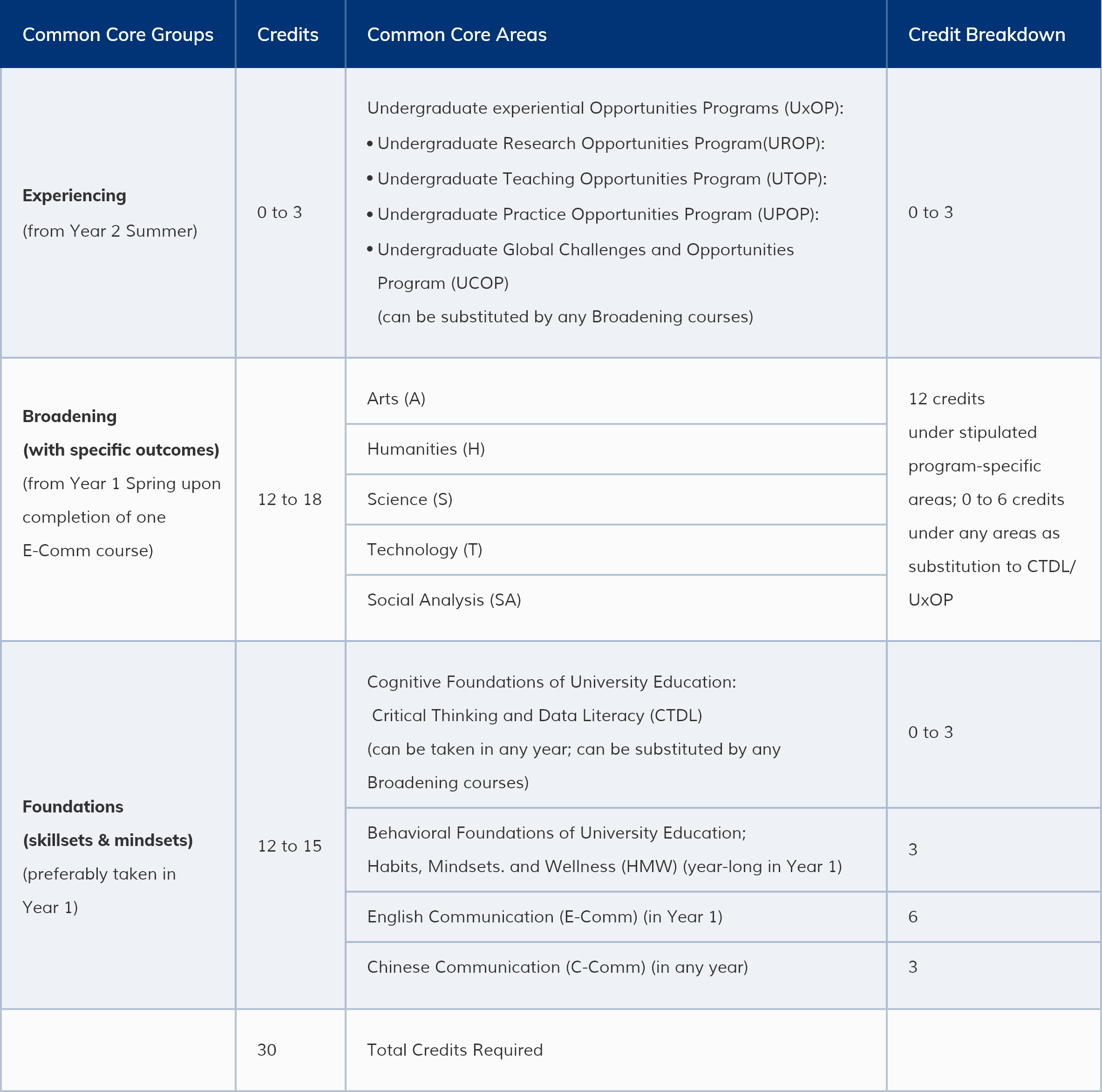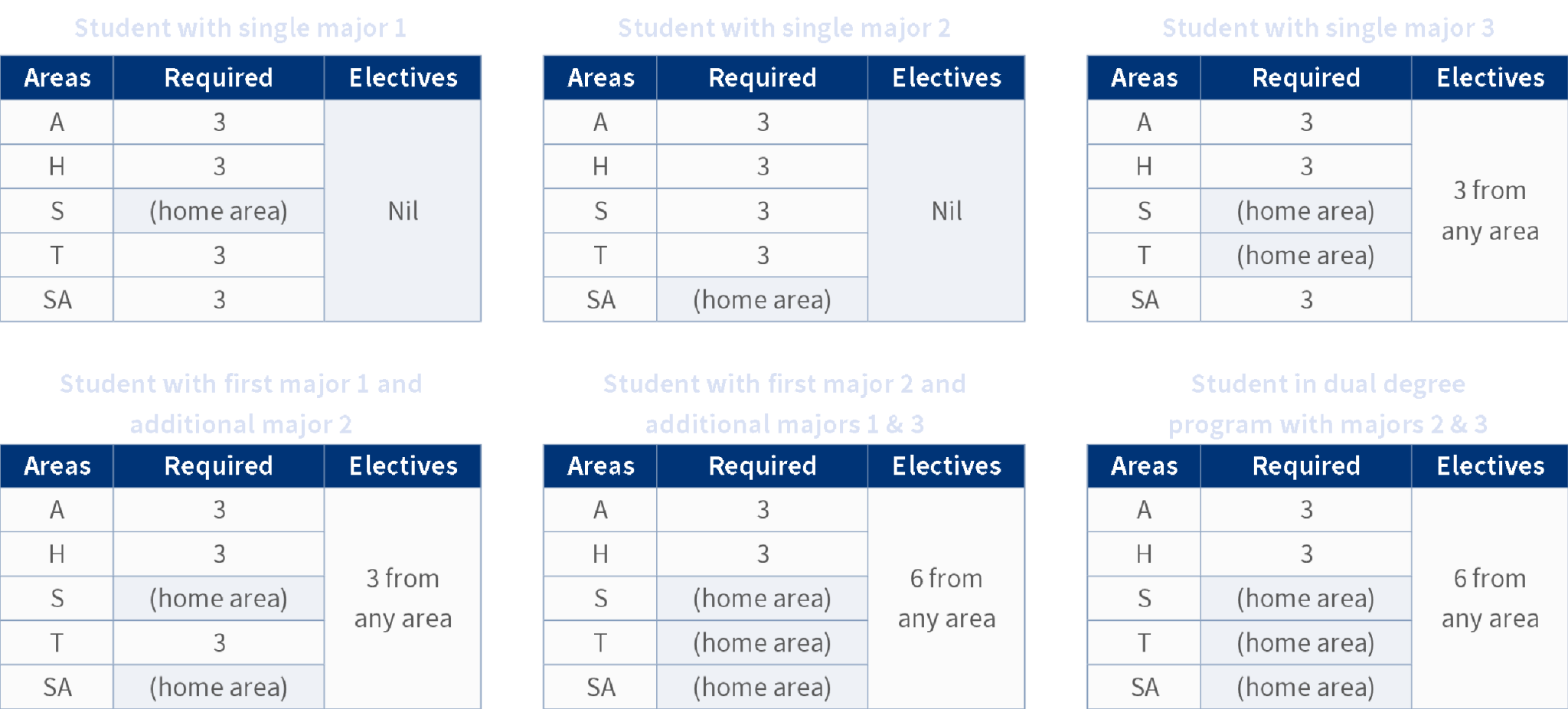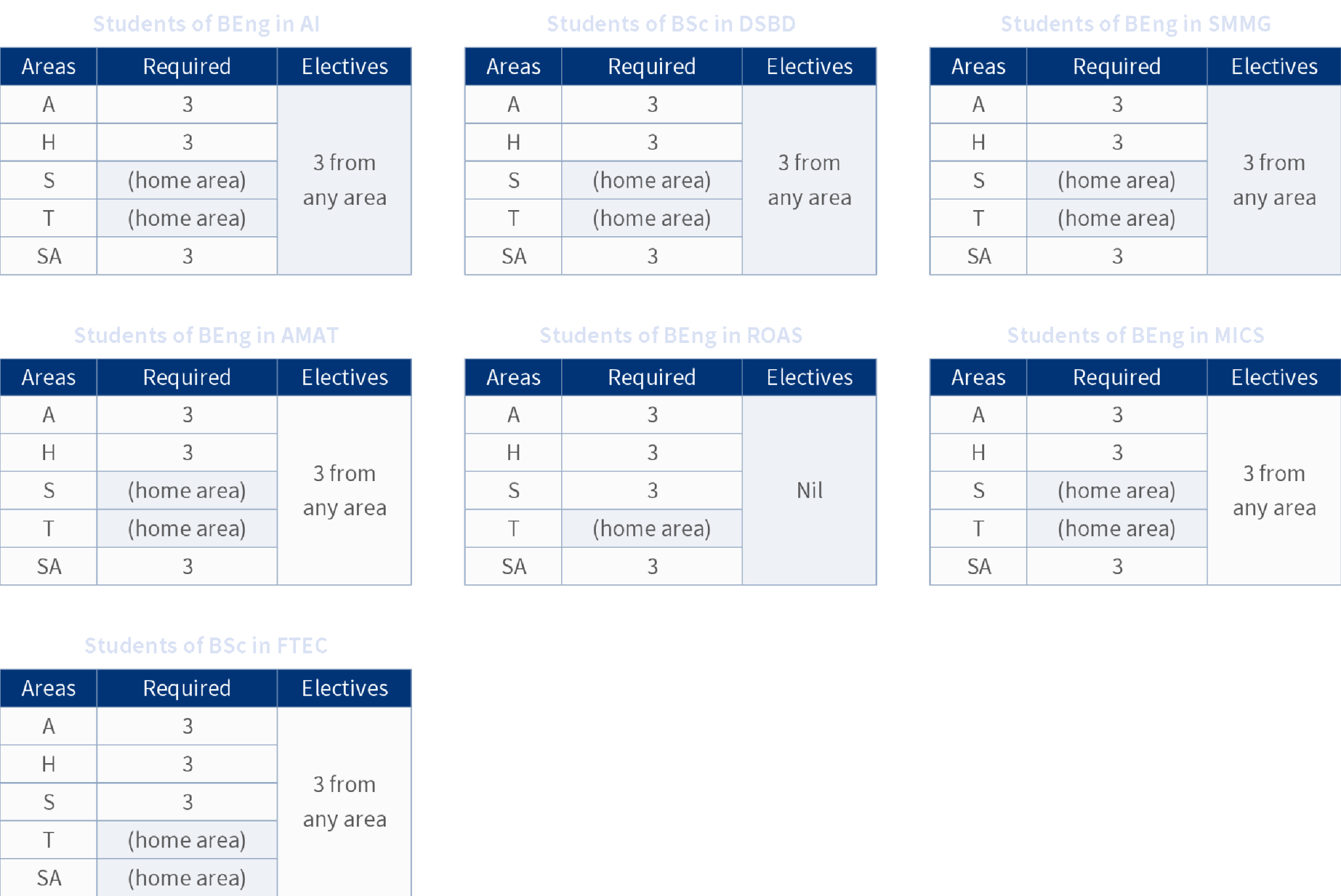Three Tiers of Common Core GroupThe UG Common Core Program will use a scaffolding model with pre-requisites built into the three Common Core groups, namely Foundations, Broadening, and Experiencing.

Foundations
| Course Code | Course Name |
|---|---|
| UCUG 1000 | Cognitive Foundations of University Education: Critical Thinking and Data Literacy |
| UCUG 1001 | Behavioral Foundations of University Education: Habits, Mindsets, and Wellness |
| UCUG 1050 | Intensive English Language For University Studies |
| UCUG 1051 | English Language for University Studies |
| UCUG 1052 | Academic English for University Studies |
| UCUG 1053 | Advance Academic English for University Studies |
| UCUG 1070 | Elementary Putonghua for Non-Chinese Language Background Students |
| UCUG 1071 | Intermediate Putonghua for Non-Chinese Language Background Students |
| UCUG 1072 | Advance Putonghua for Non-Chinese Language Background Students |
| UCUG 1073 | Elementary Reading and Writing for Non-Chinese Language Background Students |
| UCUG 1074 | Intermediate Reading and Writing for Non-Chinese Language Background Students |
| UCUG 1077 | Chinese communication essentials |
The Foundations group includes four Common Core areas: (1) Chinese Communication (C-Comm), (2) English Communication (E-Comm), and the other two areas are to provide core skillsets and mindset training to students: (3) Cognitive Foundations of University Education: Critical Thinking and Data Literacy (CTDL), and (4) Behavioral Foundations of University Education: Habits, Mindsets, and Wellness (HMW).
All Undergraduate students are required to acquire basic knowledge and competency skills in Year 1 through taking courses of Foundations group. However, students can choose to take a CTDL course in any year or substitute this course with any Broadening courses, but they are highly encouraged to take it in their first or second year of study to acquire and develop the relevant competencies for further enhancement and practice in subsequent Common Core courses in the Broadening and Experiencing groups.
A HMW course is a year-long course that all Year 1 students need to complete and uses a Pass/Fail grading scheme to induce a stress-free learning experience.
Students are required to complete two E-Comm courses in Year 1 and completion of one E-Comm course at HKUST(GZ) will be a pre-requisite requirement for taking courses in the Broadening group. While for C-Comm courses, students are encouraged to complete the course in Year 1 but flexibility will be given and the course can be completed in any year prior to taking a Undergraduate experiential Opportunities Programs (UxOP) course in the Experiencing group.
Broadening
Broadening-Arts
| Course Code | Course Name |
|---|---|
| UCUG 1500 | Arts and Creativity |
| UCUG 1501 | Introduction to Photography and Digital Imaging |
| UCUG 1502 | Video Art and Media Production |
| UCUG 1503 | Introduction to Experimental Animation |
| UCUG 1504 | The Art of Public Speaking |
| UCUG 1505 | Creative Coding and Interactive Art |
| UCUG 1506 | Enjoyment of Classical Music |
| UCUG 1507 | Figure Drawing in Motion |
| UCUG 2500 | Music of China |
Broadening-Arts & Humanities
| Course Code | Course Name |
|---|---|
| UCUG 2603 | East Asian Popular Music |
Broadening-Humanities
| Course Code | Course Name |
|---|---|
| UCUG 1600 | Intercultural Communication |
| UCUG 1603 | Sci-fi Storytelling |
Broadening-Science
| Course Code | Course Name |
|---|---|
| UCUG 1702 | Introduction to Materials Science and Applications |
| UCUG 1900 | Chemistry in Everyday Life |
Broadening-Social Analysis
| Course Code | Course Name |
|---|---|
| UCUG 1800 | Technology and Innovation: Social and Business Perspectives |
| UCUG 1804 | Population and Development in China |
| UCUG 1807 | Thinking like an Economist I: Microeconomics |
| UCUG 1808 | Sport in Society: Cultures, Media and Politics |
| UCUG 1809 | Understanding Yourself in University: A Sociological Perspective |
| UCUG 3801 | Social Inequality and Social Mobility |
Broadening-Technology
| Course Code | Course Name |
|---|---|
| UCUG 1903 | Signals and Information Technology |
| UCUG 1905 | The Impact and Value of Technology Innovation |
| UCUG 1907 | Design Thinking for Health Innovation |
The Broadening group comprises courses in five areas: Arts (A), Humanities (H), Science (S), Technology (T), and Social Analysis (SA). HKUST(GZ) students will officially declare their majors at the end of Year 2.
However, majority of them will make study pathway plannings from Summer term in Year-1 or earlier towards their major programs with the guidance of their mentors (HKUST(GZ) will design mentorship mechanism for undergraduate students). In order to be more flexible in accommodating different study plans and recognizing that some highly competent students may be able to manage heavier study load, given that they have completed one E-Comm course at HKUST(GZ), students are allowed to take courses in the Broadening group from Spring term in Year 1 based on their Major program planning. Nevertheless, students are highly encouraged to complete all Foundations courses to equip themselves with the basic skillsets before pursuing Broadening courses. Students from different Major programs will have different minimum credit requirements for each area in the Broadening group and will not be able to count any credits from their “home” area(s) so as to achieve the Broadening requirement.
Below is an illustration on program‐specific Broadening credit requirement for each program with different single Major, or with first Major and additional Major(s):

Home Area(s) of the UG Programs starting from Academic Year 2025-26:
- BEng in Artificial Intelligence (AI): Science (S), Technology (T)
- BSc in Data Science and Big Data Technology (DSBD): Science (S), Technology (T)
- BEng in Smart Manufacturing (SMMA): Science (S), Technology (T)
- BEng in Material Science and Engineering (AMAT): Science (S), Technology (T)
- BEng in Robotics (ROAS): Technology (T)
- BEng in Microelectronics (MICS): Science (S), Technology (T)
- BSc in Financial Technology (FTEC): Technology (T), Social Analysis (SA)

Experiencing
The Experiencing group will require students to choose any one out of the four structured programs offered as the Undergraduate experiential Opportunities Programs (UxOP):
- UROP: Undergraduate Research Opportunities Program;
- UTOP: Undergraduate Teaching Opportunities Program;
- UPOP: Undergraduate Practice Opportunities Program;
- UCOP: Undergraduate Global Challenges and Opportunities Program.
These Programs are experiential in nature, allow students to extend and apply competencies acquired through their study and put them in practical application in different contexts according to students’ interests, including research, teaching, internship, and study of global challenges and opportunities. As HKUST(GZ) promotes project-based learning, therefore students will be highly encouraged to do projects for UCOP courses. Similar to CTDL course in the Foundations group, the Programs provide greater flexibility to students who have different interests and career goals, students are allowed to substitute the 3-credit UxOP requirement by courses in any Common Core areas in the Broadening group regardless of their major disciplines.
Students must complete one HMW course, one C-Comm course and two E-Comm courses in Foundations group, and at least two courses from different Common Core areas in the Broadening group, before taking a UxOP course. Students would be allowed to take UxOP courses starting from Year 2 Summer term if all pre-requisite conditions are met. Each UxOP course may have pre-requisites if deem needed, and will have a different focus, but they will all be experiential and involve communications with stakeholders across multiple discipline.
